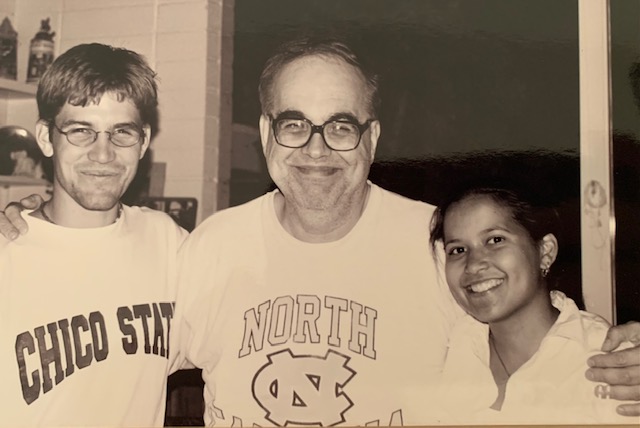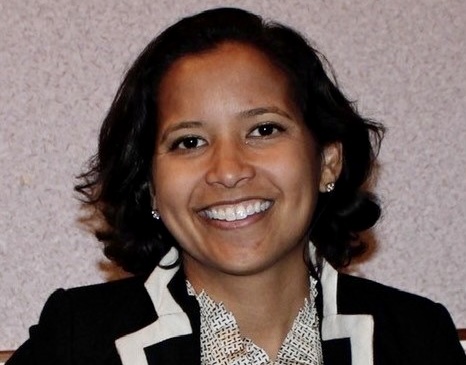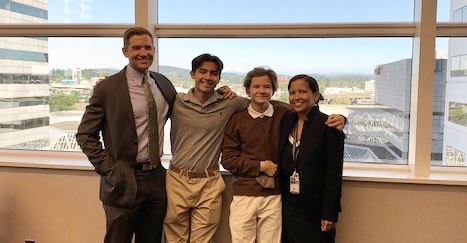5 Questions with US Attorney for Oregon Natalie Wight

Growing up, Natalie Wight (MS, Biology, ’00) never planned for a career in law. But a seed was planted for the botanist turned attorney during her graduate studies in Chico, and today she is the state of Oregon’s new top law enforcement official.

The Portland native was confirmed to serve as US attorney in September after being nominated by President Joe Biden. There is a crossover from science to law, Wight explains. She learned to be analytical, compile scientific evidence together, and present evidence and findings as a biology student at Chico State.
As a graduate student, Wight joined a team of scientists researching where the area’s next reservoir should go. While her team presented findings to a board, a group of suit-clad environmental attorneys made their case to the board and made an impression with Wight.
Now, more than 20 years later, Wight is her home state’s U.S. attorney—the first Black person and the second Asian American to serve in this role. When not working, she also volunteers at Cleveland High School as a coach for the Cleveland Mock Trial program, which she started with her husband, Casey Nokes, also an attorney, 10 years ago.
“I’m able to do this job as a lawyer because of everything I learned in Chico and because of my professors,” she said.
Wight still holds Chico and the University, where she met Nokes (English, ’00), near and dear to her heart. The couple has two boys, one of which they gave the middle name of Bidwell.
“When things are important to me, I want to make them permanent,” she said.
What went through your mind when you were nominated by the president to serve as the US attorney for your home state?
I am not going to pretend that it was not a huge deal. The moment it was announced that the president was going to nominate me, my entire life flashed before my eyes. Everything I’d ever done or thought about or mistakes I made or successes I had just passed through my mind. I also felt very grateful. It was so humbling. I felt an even stronger duty to make the most of this and do everything I can to help. People put their faith and trust in me, and I must do it right.

What are your thoughts on becoming the first Black person and the second Asian American person to serve in this role?
It’s mixed. There is a lot of pride that comes with it. I work with students from different backgrounds. I could see in their eyes that having someone from their high school being a role model—a minority woman who’s come a long way—felt important. But at the same time, in my career working for the Department of Justice, it has never been an issue whether I’m female or my race. But I will say, as a brown-skinned female, it’s something you think about. For me, I want to be seen for my merits, and hopefully, people believe I’m qualified for this job.
What has surprised you most about your professional journey?
At the Department of Justice, we don’t like surprises. We are investigators. We should know things ahead of time. But I’m in an age group where I have been a lawyer as social media and all these digital tools are changing the landscape of not just regular life but of law and crime. The pace at which things keep evolving surprised me, and we must stay caught up and ahead of the game.
How did your experience at Chico State help you on your journey?
I loved every moment at Chico State. It’s a magical place and it’s beautiful, but academically, it was the first time I’d ever felt like the work that I was doing was so broad and important. I have three professors who were fantastic and had a huge influence and impact on my life:
Richard Demaree, my electron microscopy professor, influenced me and guided me in becoming a teacher. I didn’t think that was a calling of mine, but he fostered that, and I became excited about working with undergraduate students.
My major professor, Robert Schlising. He was the kindest, most patient, caring human being on the face of the planet. He helped me with my thesis and planted the seed for me to think bigger and connected me with the US Fish and Wildlife Service for my research.
And Emeritus Professor of English Roger Kaye. I never had him for a class, but he probably had the biggest effect on me. I was already in grad school, but he was mentoring my husband (then boyfriend). He didn’t care that I wasn’t an English major. I was thinking about law school—I planned to go someplace local. He said, “No way. And this is why these schools would be lucky to have you.” We worked on my essays and my applications. He helped push me, and I think it’s the reason I got into Notre Dame Law School.
How do you Do and Dare?
I try to pay it forward with my students at Cleveland High School [where she graduated from in 1992]. I joke that mock trial is more of a college preparatory application support group, and we do a little mock trial on the side. I want to do for them what Roger Kaye did for me. Roger Kaye changed my life by pushing me outside my envelope and pushing me to reach a little bit further. I push my students, and I dare them to go beyond the easy application or easy essay.


